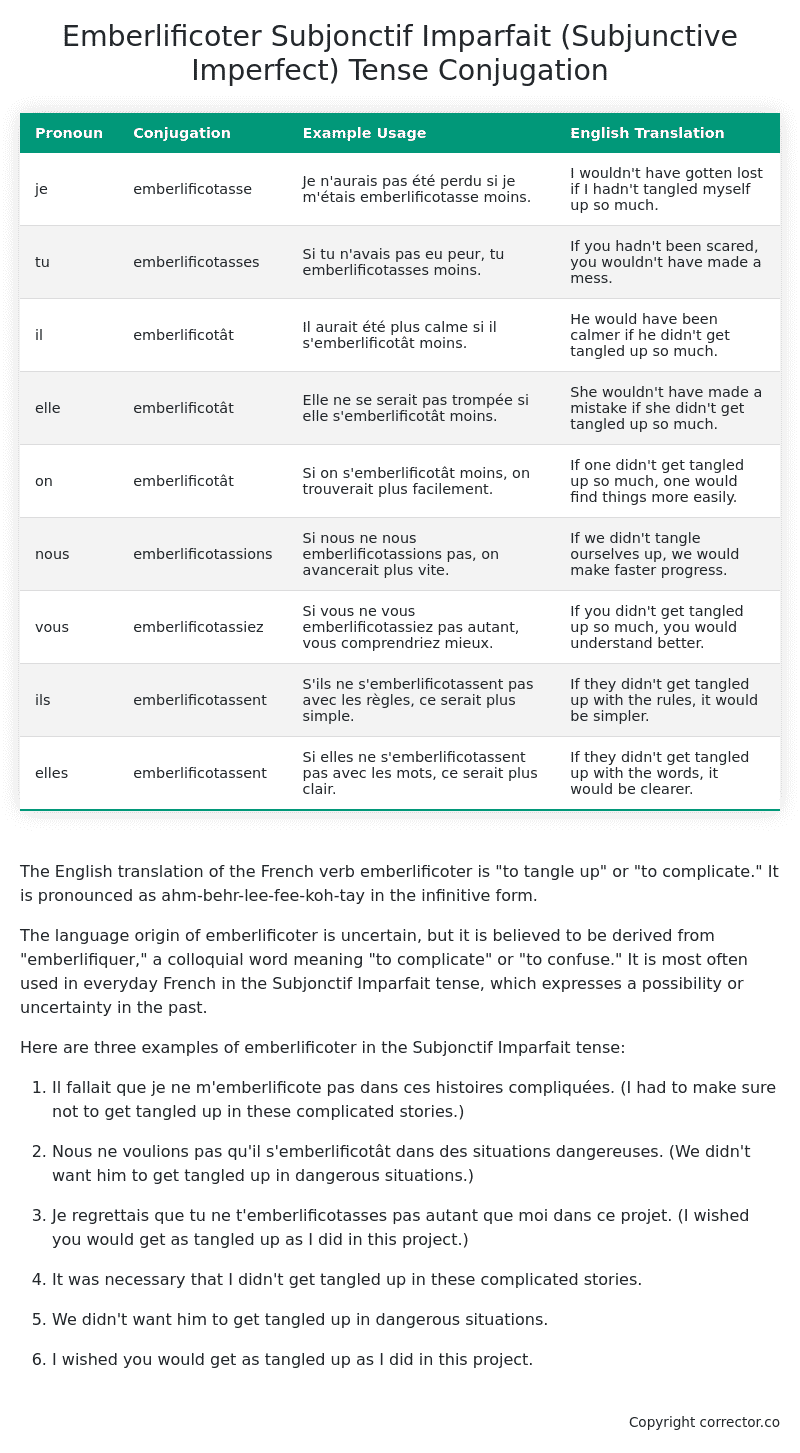Subjonctif Imparfait (Subjunctive Imperfect) Tense Conjugation of the French Verb emberlificoter
Introduction to the verb emberlificoter
The English translation of the French verb emberlificoter is “to tangle up” or “to complicate.” It is pronounced as ahm-behr-lee-fee-koh-tay in the infinitive form.
The language origin of emberlificoter is uncertain, but it is believed to be derived from “emberlifiquer,” a colloquial word meaning “to complicate” or “to confuse.” It is most often used in everyday French in the Subjonctif Imparfait tense, which expresses a possibility or uncertainty in the past.
Here are three examples of emberlificoter in the Subjonctif Imparfait tense:
-
Il fallait que je ne m’emberlificote pas dans ces histoires compliquées. (I had to make sure not to get tangled up in these complicated stories.)
-
Nous ne voulions pas qu’il s’emberlificotât dans des situations dangereuses. (We didn’t want him to get tangled up in dangerous situations.)
-
Je regrettais que tu ne t’emberlificotasses pas autant que moi dans ce projet. (I wished you would get as tangled up as I did in this project.)
-
It was necessary that I didn’t get tangled up in these complicated stories.
-
We didn’t want him to get tangled up in dangerous situations.
-
I wished you would get as tangled up as I did in this project.
Table of the Subjonctif Imparfait (Subjunctive Imperfect) Tense Conjugation of emberlificoter
| Pronoun | Conjugation | Example Usage | English Translation |
|---|---|---|---|
| je | emberlificotasse | Je n’aurais pas été perdu si je m’étais emberlificotasse moins. | I wouldn’t have gotten lost if I hadn’t tangled myself up so much. |
| tu | emberlificotasses | Si tu n’avais pas eu peur, tu emberlificotasses moins. | If you hadn’t been scared, you wouldn’t have made a mess. |
| il | emberlificotât | Il aurait été plus calme si il s’emberlificotât moins. | He would have been calmer if he didn’t get tangled up so much. |
| elle | emberlificotât | Elle ne se serait pas trompée si elle s’emberlificotât moins. | She wouldn’t have made a mistake if she didn’t get tangled up so much. |
| on | emberlificotât | Si on s’emberlificotât moins, on trouverait plus facilement. | If one didn’t get tangled up so much, one would find things more easily. |
| nous | emberlificotassions | Si nous ne nous emberlificotassions pas, on avancerait plus vite. | If we didn’t tangle ourselves up, we would make faster progress. |
| vous | emberlificotassiez | Si vous ne vous emberlificotassiez pas autant, vous comprendriez mieux. | If you didn’t get tangled up so much, you would understand better. |
| ils | emberlificotassent | S’ils ne s’emberlificotassent pas avec les règles, ce serait plus simple. | If they didn’t get tangled up with the rules, it would be simpler. |
| elles | emberlificotassent | Si elles ne s’emberlificotassent pas avec les mots, ce serait plus clair. | If they didn’t get tangled up with the words, it would be clearer. |
Other Conjugations for Emberlificoter.
Le Present (Present Tense) Conjugation of the French Verb emberlificoter
Imparfait (Imperfect) Tense Conjugation of the French Verb emberlificoter
Passé Simple (Simple Past) Tense Conjugation of the French Verb emberlificoter
Passé Composé (Present Perfect) Tense Conjugation of the French Verb emberlificoter
Futur Simple (Simple Future) Tense Conjugation of the French Verb emberlificoter
Futur Proche (Near Future) Tense Conjugation of the French Verb emberlificoter
Plus-que-parfait (Pluperfect) Tense Conjugation of the French Verb emberlificoter
Passé Antérieur (Past Anterior) Tense Conjugation of the French Verb emberlificoter
Futur Antérieur (Future Anterior) Tense Conjugation of the French Verb emberlificoter
Subjonctif Présent (Subjunctive Present) Tense Conjugation of the French Verb emberlificoter
Subjonctif Passé (Subjunctive Past) Tense Conjugation of the French Verb emberlificoter
Subjonctif Imparfait (Subjunctive Imperfect) Tense Conjugation of the French Verb emberlificoter (this article)
Conditionnel Présent (Conditional Present) Tense Conjugation of the French Verb emberlificoter
Conditionnel Passé (Conditional Past) Tense Conjugation of the French Verb emberlificoter
L’impératif Présent (Imperative Present) Tense Conjugation of the French Verb emberlificoter
L’infinitif Présent (Infinitive Present) Tense Conjugation of the French Verb emberlificoter
Struggling with French verbs or the language in general? Why not use our free French Grammar Checker – no registration required!
Get a FREE Download Study Sheet of this Conjugation 🔥
Simply right click the image below, click “save image” and get your free reference for the emberlificoter Subjonctif Imparfait tense conjugation!

Emberlificoter – About the French Subjonctif Imparfait (Subjunctive Imperfect) Tense
Formation
Common Everyday Usage Patterns
Interactions with Other Tenses
Subjonctif Présent
Indicatif Passé Composé
Conditional
Conditional Perfect
Summary
I hope you enjoyed this article on the verb emberlificoter. Still in a learning mood? Check out another TOTALLY random French verb conjugation!


